Essay: Healthcare Problem of Nurse Retention and Stress Impact
VerifiedAdded on 2022/11/22
|12
|3542
|67
Essay
AI Summary
This essay delves into the pressing issue of nurse retention within the healthcare sector, exploring its complex relationship with occupational stress and burnout. The introduction highlights the declining nurse retention rates in Australia and the implications for healthcare quality, referencing statistics from Health Workforce Australia and the OECD. The essay examines the causes and consequences of occupational stress, including extended work hours, inadequate staffing, and compassion fatigue, and their impact on patient care and medication errors. It analyzes the problem through structural, human resource, political, and symbolic frames, discussing issues such as the hierarchical structure of healthcare, limited career opportunities, government policies, and the physiological effects of stress. The essay concludes with recommendations for improvement, focusing on human resource management strategies like developing coping skills, transformational leadership, and addressing nurse-to-patient ratios. The goal is to improve nurse retention, reduce occupational stress, and enhance the quality of patient care.
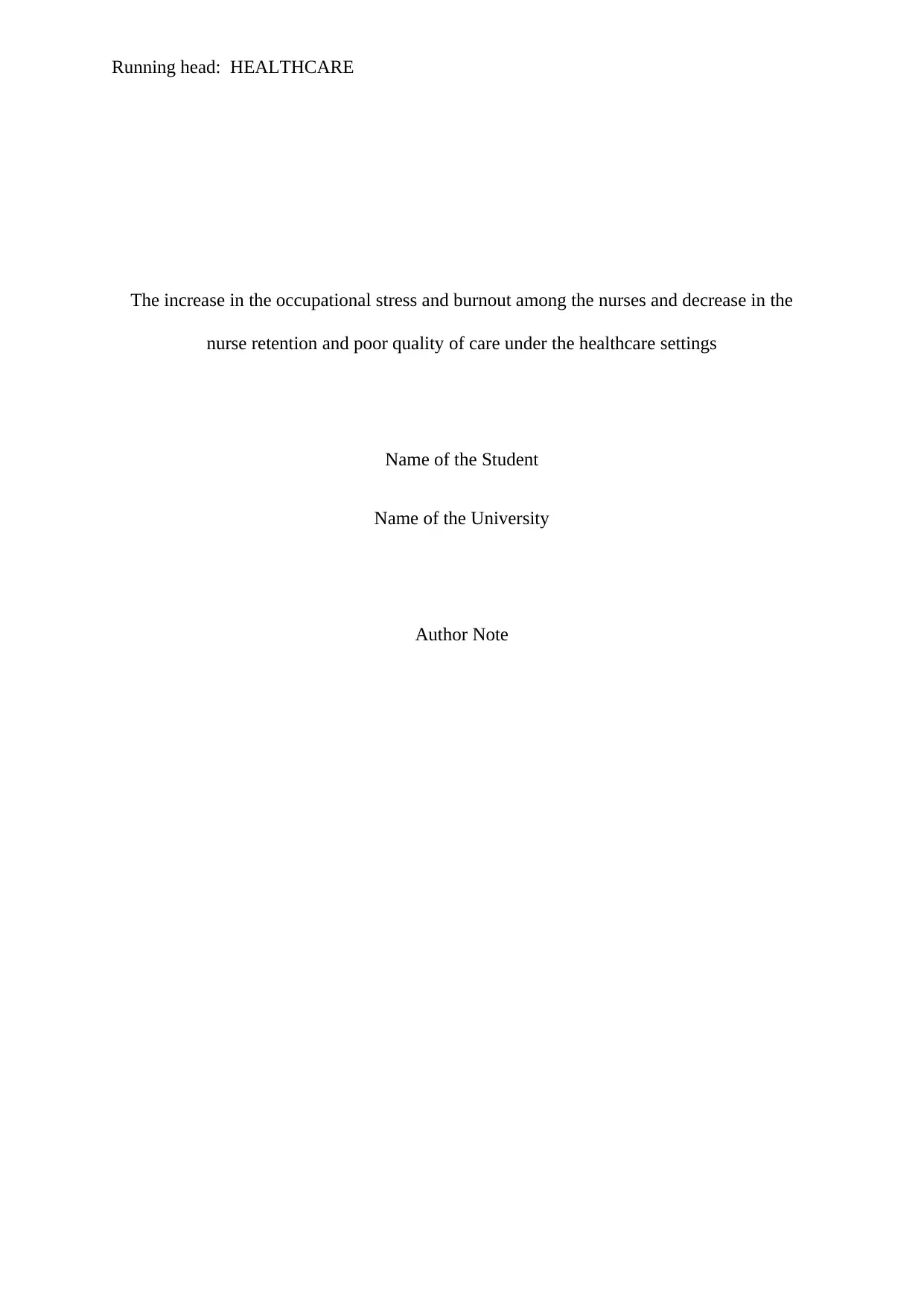
Running head: HEALTHCARE
The increase in the occupational stress and burnout among the nurses and decrease in the
nurse retention and poor quality of care under the healthcare settings
Name of the Student
Name of the University
Author Note
The increase in the occupational stress and burnout among the nurses and decrease in the
nurse retention and poor quality of care under the healthcare settings
Name of the Student
Name of the University
Author Note
Paraphrase This Document
Need a fresh take? Get an instant paraphrase of this document with our AI Paraphraser
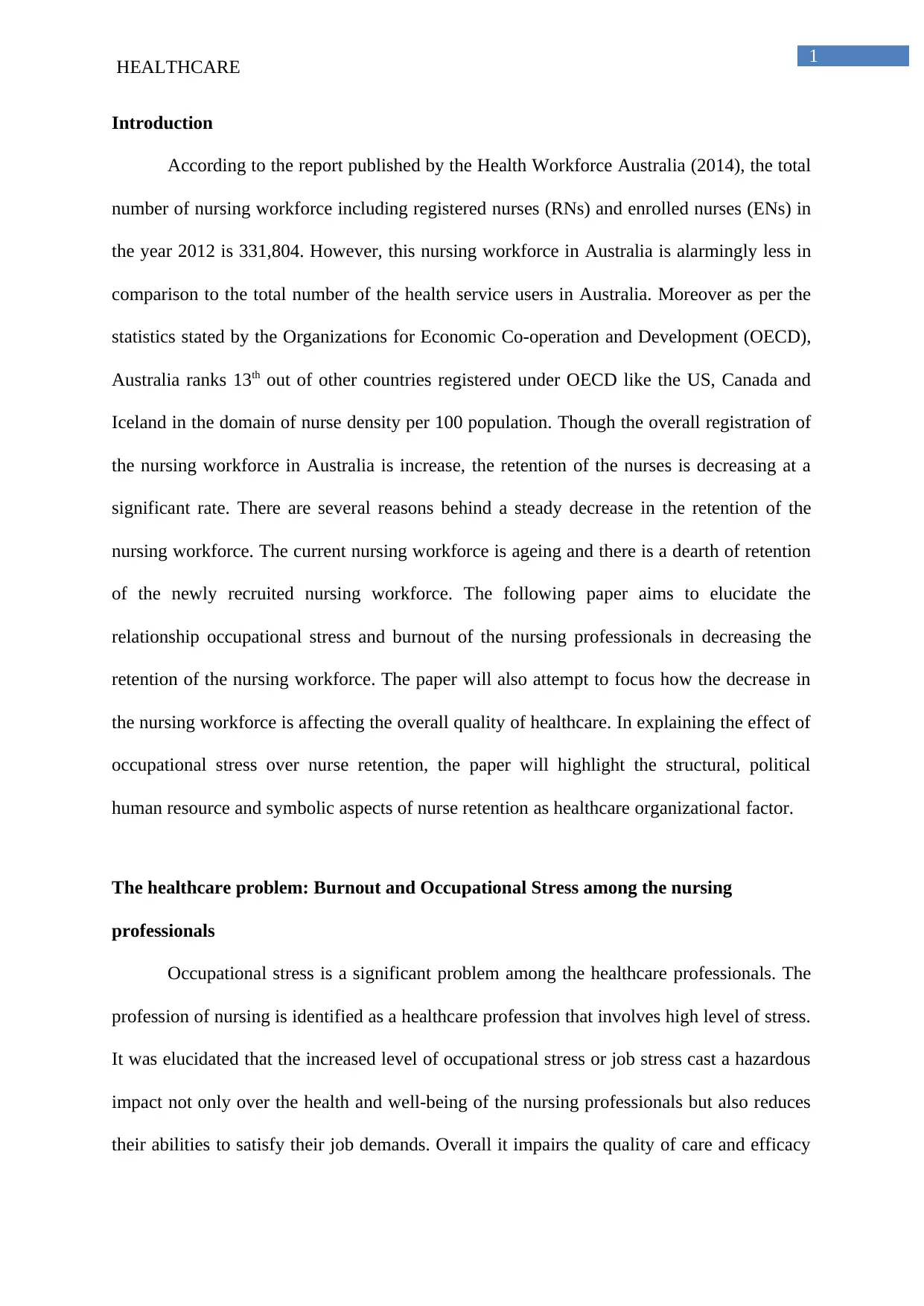
1
HEALTHCARE
Introduction
According to the report published by the Health Workforce Australia (2014), the total
number of nursing workforce including registered nurses (RNs) and enrolled nurses (ENs) in
the year 2012 is 331,804. However, this nursing workforce in Australia is alarmingly less in
comparison to the total number of the health service users in Australia. Moreover as per the
statistics stated by the Organizations for Economic Co-operation and Development (OECD),
Australia ranks 13th out of other countries registered under OECD like the US, Canada and
Iceland in the domain of nurse density per 100 population. Though the overall registration of
the nursing workforce in Australia is increase, the retention of the nurses is decreasing at a
significant rate. There are several reasons behind a steady decrease in the retention of the
nursing workforce. The current nursing workforce is ageing and there is a dearth of retention
of the newly recruited nursing workforce. The following paper aims to elucidate the
relationship occupational stress and burnout of the nursing professionals in decreasing the
retention of the nursing workforce. The paper will also attempt to focus how the decrease in
the nursing workforce is affecting the overall quality of healthcare. In explaining the effect of
occupational stress over nurse retention, the paper will highlight the structural, political
human resource and symbolic aspects of nurse retention as healthcare organizational factor.
The healthcare problem: Burnout and Occupational Stress among the nursing
professionals
Occupational stress is a significant problem among the healthcare professionals. The
profession of nursing is identified as a healthcare profession that involves high level of stress.
It was elucidated that the increased level of occupational stress or job stress cast a hazardous
impact not only over the health and well-being of the nursing professionals but also reduces
their abilities to satisfy their job demands. Overall it impairs the quality of care and efficacy
HEALTHCARE
Introduction
According to the report published by the Health Workforce Australia (2014), the total
number of nursing workforce including registered nurses (RNs) and enrolled nurses (ENs) in
the year 2012 is 331,804. However, this nursing workforce in Australia is alarmingly less in
comparison to the total number of the health service users in Australia. Moreover as per the
statistics stated by the Organizations for Economic Co-operation and Development (OECD),
Australia ranks 13th out of other countries registered under OECD like the US, Canada and
Iceland in the domain of nurse density per 100 population. Though the overall registration of
the nursing workforce in Australia is increase, the retention of the nurses is decreasing at a
significant rate. There are several reasons behind a steady decrease in the retention of the
nursing workforce. The current nursing workforce is ageing and there is a dearth of retention
of the newly recruited nursing workforce. The following paper aims to elucidate the
relationship occupational stress and burnout of the nursing professionals in decreasing the
retention of the nursing workforce. The paper will also attempt to focus how the decrease in
the nursing workforce is affecting the overall quality of healthcare. In explaining the effect of
occupational stress over nurse retention, the paper will highlight the structural, political
human resource and symbolic aspects of nurse retention as healthcare organizational factor.
The healthcare problem: Burnout and Occupational Stress among the nursing
professionals
Occupational stress is a significant problem among the healthcare professionals. The
profession of nursing is identified as a healthcare profession that involves high level of stress.
It was elucidated that the increased level of occupational stress or job stress cast a hazardous
impact not only over the health and well-being of the nursing professionals but also reduces
their abilities to satisfy their job demands. Overall it impairs the quality of care and efficacy
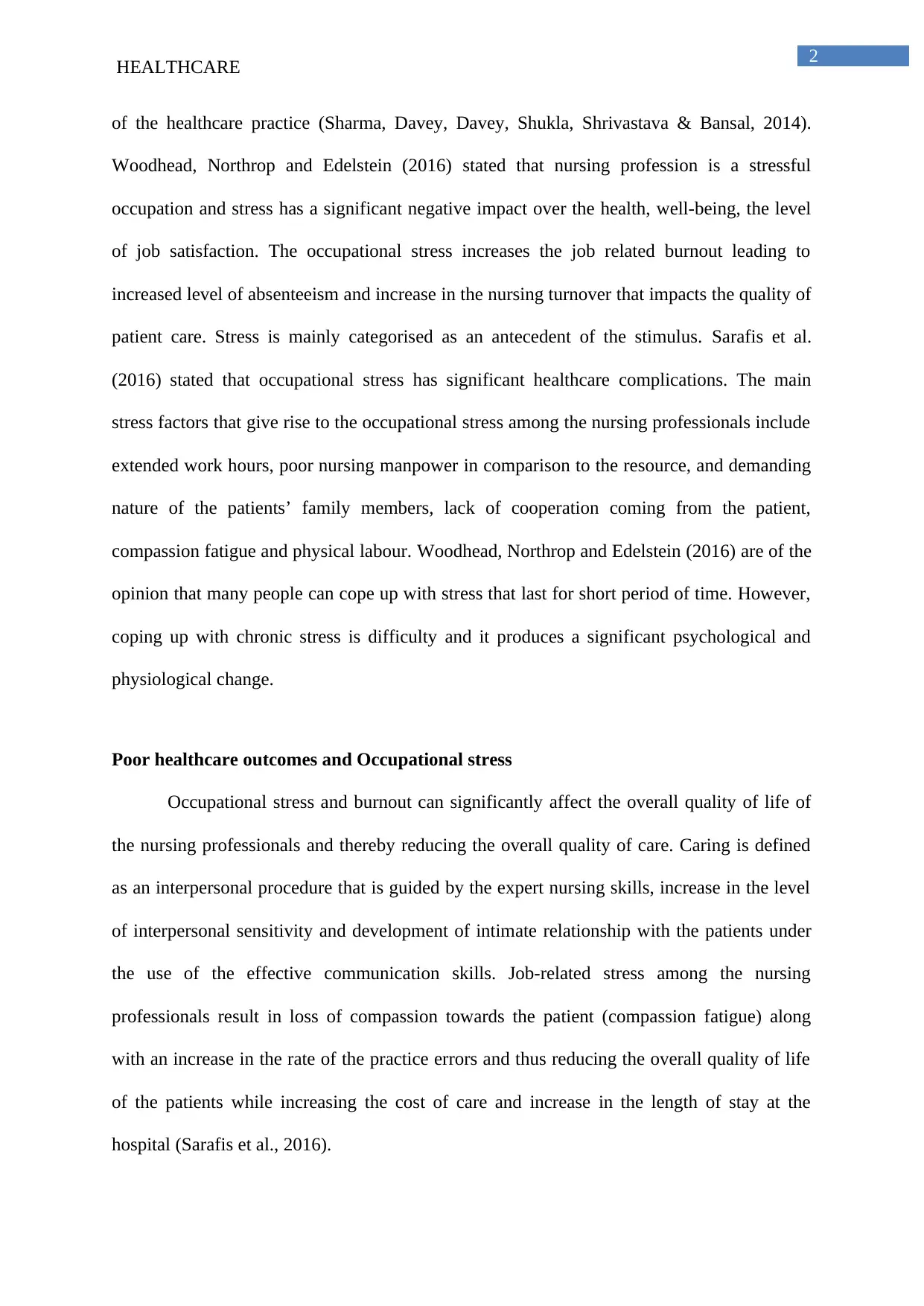
2
HEALTHCARE
of the healthcare practice (Sharma, Davey, Davey, Shukla, Shrivastava & Bansal, 2014).
Woodhead, Northrop and Edelstein (2016) stated that nursing profession is a stressful
occupation and stress has a significant negative impact over the health, well-being, the level
of job satisfaction. The occupational stress increases the job related burnout leading to
increased level of absenteeism and increase in the nursing turnover that impacts the quality of
patient care. Stress is mainly categorised as an antecedent of the stimulus. Sarafis et al.
(2016) stated that occupational stress has significant healthcare complications. The main
stress factors that give rise to the occupational stress among the nursing professionals include
extended work hours, poor nursing manpower in comparison to the resource, and demanding
nature of the patients’ family members, lack of cooperation coming from the patient,
compassion fatigue and physical labour. Woodhead, Northrop and Edelstein (2016) are of the
opinion that many people can cope up with stress that last for short period of time. However,
coping up with chronic stress is difficulty and it produces a significant psychological and
physiological change.
Poor healthcare outcomes and Occupational stress
Occupational stress and burnout can significantly affect the overall quality of life of
the nursing professionals and thereby reducing the overall quality of care. Caring is defined
as an interpersonal procedure that is guided by the expert nursing skills, increase in the level
of interpersonal sensitivity and development of intimate relationship with the patients under
the use of the effective communication skills. Job-related stress among the nursing
professionals result in loss of compassion towards the patient (compassion fatigue) along
with an increase in the rate of the practice errors and thus reducing the overall quality of life
of the patients while increasing the cost of care and increase in the length of stay at the
hospital (Sarafis et al., 2016).
HEALTHCARE
of the healthcare practice (Sharma, Davey, Davey, Shukla, Shrivastava & Bansal, 2014).
Woodhead, Northrop and Edelstein (2016) stated that nursing profession is a stressful
occupation and stress has a significant negative impact over the health, well-being, the level
of job satisfaction. The occupational stress increases the job related burnout leading to
increased level of absenteeism and increase in the nursing turnover that impacts the quality of
patient care. Stress is mainly categorised as an antecedent of the stimulus. Sarafis et al.
(2016) stated that occupational stress has significant healthcare complications. The main
stress factors that give rise to the occupational stress among the nursing professionals include
extended work hours, poor nursing manpower in comparison to the resource, and demanding
nature of the patients’ family members, lack of cooperation coming from the patient,
compassion fatigue and physical labour. Woodhead, Northrop and Edelstein (2016) are of the
opinion that many people can cope up with stress that last for short period of time. However,
coping up with chronic stress is difficulty and it produces a significant psychological and
physiological change.
Poor healthcare outcomes and Occupational stress
Occupational stress and burnout can significantly affect the overall quality of life of
the nursing professionals and thereby reducing the overall quality of care. Caring is defined
as an interpersonal procedure that is guided by the expert nursing skills, increase in the level
of interpersonal sensitivity and development of intimate relationship with the patients under
the use of the effective communication skills. Job-related stress among the nursing
professionals result in loss of compassion towards the patient (compassion fatigue) along
with an increase in the rate of the practice errors and thus reducing the overall quality of life
of the patients while increasing the cost of care and increase in the length of stay at the
hospital (Sarafis et al., 2016).
⊘ This is a preview!⊘
Do you want full access?
Subscribe today to unlock all pages.

Trusted by 1+ million students worldwide
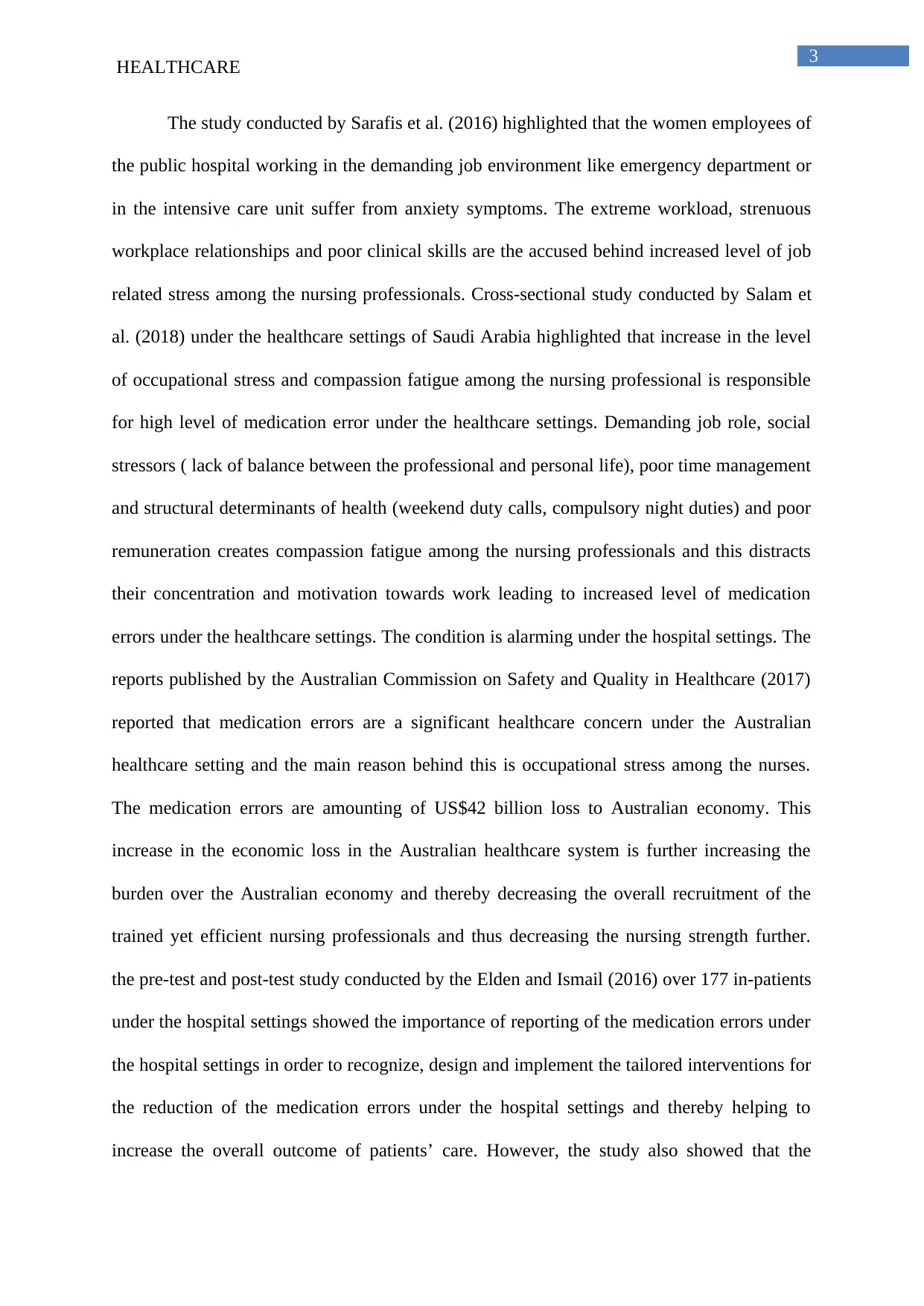
3
HEALTHCARE
The study conducted by Sarafis et al. (2016) highlighted that the women employees of
the public hospital working in the demanding job environment like emergency department or
in the intensive care unit suffer from anxiety symptoms. The extreme workload, strenuous
workplace relationships and poor clinical skills are the accused behind increased level of job
related stress among the nursing professionals. Cross-sectional study conducted by Salam et
al. (2018) under the healthcare settings of Saudi Arabia highlighted that increase in the level
of occupational stress and compassion fatigue among the nursing professional is responsible
for high level of medication error under the healthcare settings. Demanding job role, social
stressors ( lack of balance between the professional and personal life), poor time management
and structural determinants of health (weekend duty calls, compulsory night duties) and poor
remuneration creates compassion fatigue among the nursing professionals and this distracts
their concentration and motivation towards work leading to increased level of medication
errors under the healthcare settings. The condition is alarming under the hospital settings. The
reports published by the Australian Commission on Safety and Quality in Healthcare (2017)
reported that medication errors are a significant healthcare concern under the Australian
healthcare setting and the main reason behind this is occupational stress among the nurses.
The medication errors are amounting of US$42 billion loss to Australian economy. This
increase in the economic loss in the Australian healthcare system is further increasing the
burden over the Australian economy and thereby decreasing the overall recruitment of the
trained yet efficient nursing professionals and thus decreasing the nursing strength further.
the pre-test and post-test study conducted by the Elden and Ismail (2016) over 177 in-patients
under the hospital settings showed the importance of reporting of the medication errors under
the hospital settings in order to recognize, design and implement the tailored interventions for
the reduction of the medication errors under the hospital settings and thereby helping to
increase the overall outcome of patients’ care. However, the study also showed that the
HEALTHCARE
The study conducted by Sarafis et al. (2016) highlighted that the women employees of
the public hospital working in the demanding job environment like emergency department or
in the intensive care unit suffer from anxiety symptoms. The extreme workload, strenuous
workplace relationships and poor clinical skills are the accused behind increased level of job
related stress among the nursing professionals. Cross-sectional study conducted by Salam et
al. (2018) under the healthcare settings of Saudi Arabia highlighted that increase in the level
of occupational stress and compassion fatigue among the nursing professional is responsible
for high level of medication error under the healthcare settings. Demanding job role, social
stressors ( lack of balance between the professional and personal life), poor time management
and structural determinants of health (weekend duty calls, compulsory night duties) and poor
remuneration creates compassion fatigue among the nursing professionals and this distracts
their concentration and motivation towards work leading to increased level of medication
errors under the healthcare settings. The condition is alarming under the hospital settings. The
reports published by the Australian Commission on Safety and Quality in Healthcare (2017)
reported that medication errors are a significant healthcare concern under the Australian
healthcare setting and the main reason behind this is occupational stress among the nurses.
The medication errors are amounting of US$42 billion loss to Australian economy. This
increase in the economic loss in the Australian healthcare system is further increasing the
burden over the Australian economy and thereby decreasing the overall recruitment of the
trained yet efficient nursing professionals and thus decreasing the nursing strength further.
the pre-test and post-test study conducted by the Elden and Ismail (2016) over 177 in-patients
under the hospital settings showed the importance of reporting of the medication errors under
the hospital settings in order to recognize, design and implement the tailored interventions for
the reduction of the medication errors under the hospital settings and thereby helping to
increase the overall outcome of patients’ care. However, the study also showed that the
Paraphrase This Document
Need a fresh take? Get an instant paraphrase of this document with our AI Paraphraser
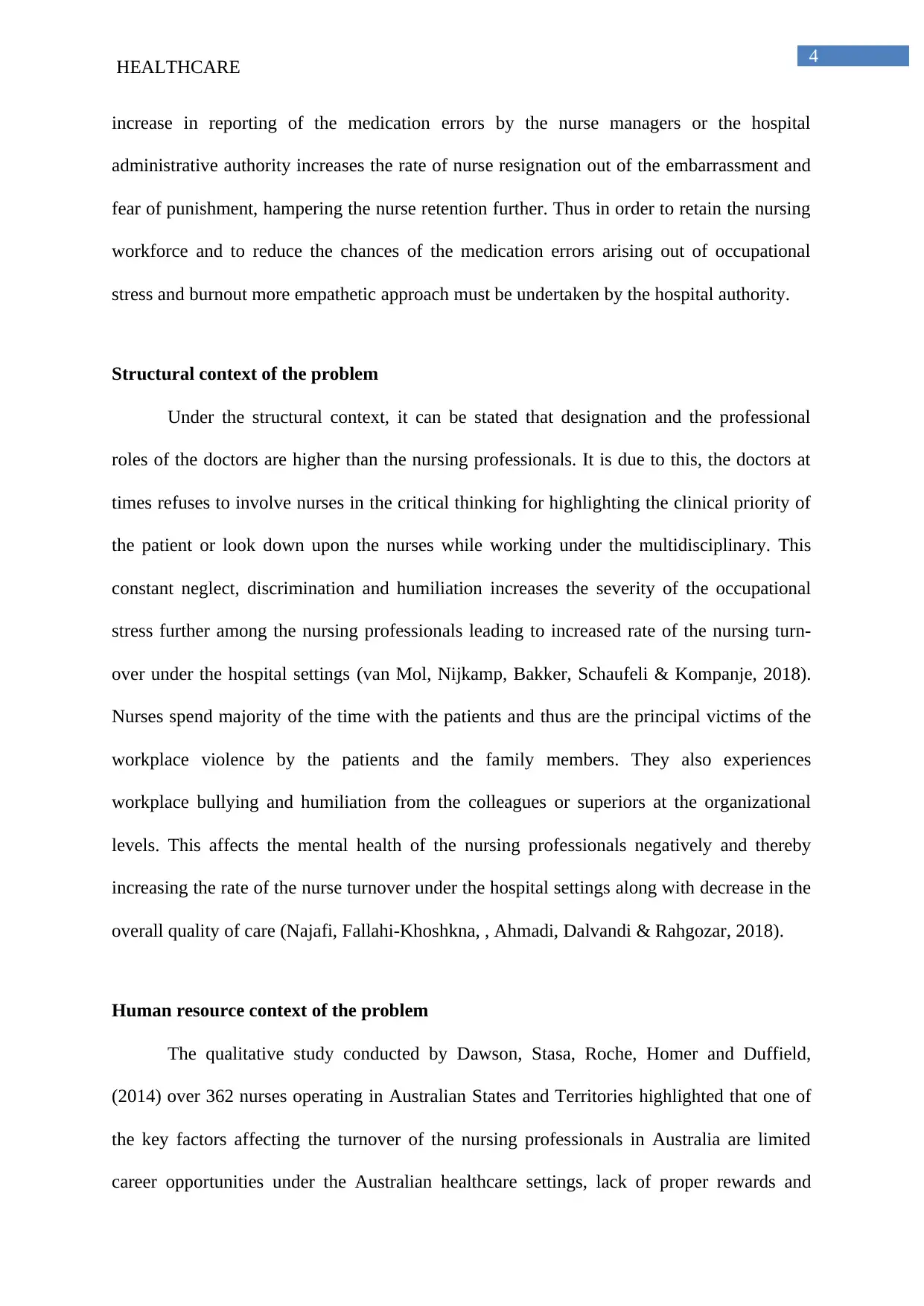
4
HEALTHCARE
increase in reporting of the medication errors by the nurse managers or the hospital
administrative authority increases the rate of nurse resignation out of the embarrassment and
fear of punishment, hampering the nurse retention further. Thus in order to retain the nursing
workforce and to reduce the chances of the medication errors arising out of occupational
stress and burnout more empathetic approach must be undertaken by the hospital authority.
Structural context of the problem
Under the structural context, it can be stated that designation and the professional
roles of the doctors are higher than the nursing professionals. It is due to this, the doctors at
times refuses to involve nurses in the critical thinking for highlighting the clinical priority of
the patient or look down upon the nurses while working under the multidisciplinary. This
constant neglect, discrimination and humiliation increases the severity of the occupational
stress further among the nursing professionals leading to increased rate of the nursing turn-
over under the hospital settings (van Mol, Nijkamp, Bakker, Schaufeli & Kompanje, 2018).
Nurses spend majority of the time with the patients and thus are the principal victims of the
workplace violence by the patients and the family members. They also experiences
workplace bullying and humiliation from the colleagues or superiors at the organizational
levels. This affects the mental health of the nursing professionals negatively and thereby
increasing the rate of the nurse turnover under the hospital settings along with decrease in the
overall quality of care (Najafi, Fallahi‐Khoshkna, , Ahmadi, Dalvandi & Rahgozar, 2018).
Human resource context of the problem
The qualitative study conducted by Dawson, Stasa, Roche, Homer and Duffield,
(2014) over 362 nurses operating in Australian States and Territories highlighted that one of
the key factors affecting the turnover of the nursing professionals in Australia are limited
career opportunities under the Australian healthcare settings, lack of proper rewards and
HEALTHCARE
increase in reporting of the medication errors by the nurse managers or the hospital
administrative authority increases the rate of nurse resignation out of the embarrassment and
fear of punishment, hampering the nurse retention further. Thus in order to retain the nursing
workforce and to reduce the chances of the medication errors arising out of occupational
stress and burnout more empathetic approach must be undertaken by the hospital authority.
Structural context of the problem
Under the structural context, it can be stated that designation and the professional
roles of the doctors are higher than the nursing professionals. It is due to this, the doctors at
times refuses to involve nurses in the critical thinking for highlighting the clinical priority of
the patient or look down upon the nurses while working under the multidisciplinary. This
constant neglect, discrimination and humiliation increases the severity of the occupational
stress further among the nursing professionals leading to increased rate of the nursing turn-
over under the hospital settings (van Mol, Nijkamp, Bakker, Schaufeli & Kompanje, 2018).
Nurses spend majority of the time with the patients and thus are the principal victims of the
workplace violence by the patients and the family members. They also experiences
workplace bullying and humiliation from the colleagues or superiors at the organizational
levels. This affects the mental health of the nursing professionals negatively and thereby
increasing the rate of the nurse turnover under the hospital settings along with decrease in the
overall quality of care (Najafi, Fallahi‐Khoshkna, , Ahmadi, Dalvandi & Rahgozar, 2018).
Human resource context of the problem
The qualitative study conducted by Dawson, Stasa, Roche, Homer and Duffield,
(2014) over 362 nurses operating in Australian States and Territories highlighted that one of
the key factors affecting the turnover of the nursing professionals in Australia are limited
career opportunities under the Australian healthcare settings, lack of proper rewards and
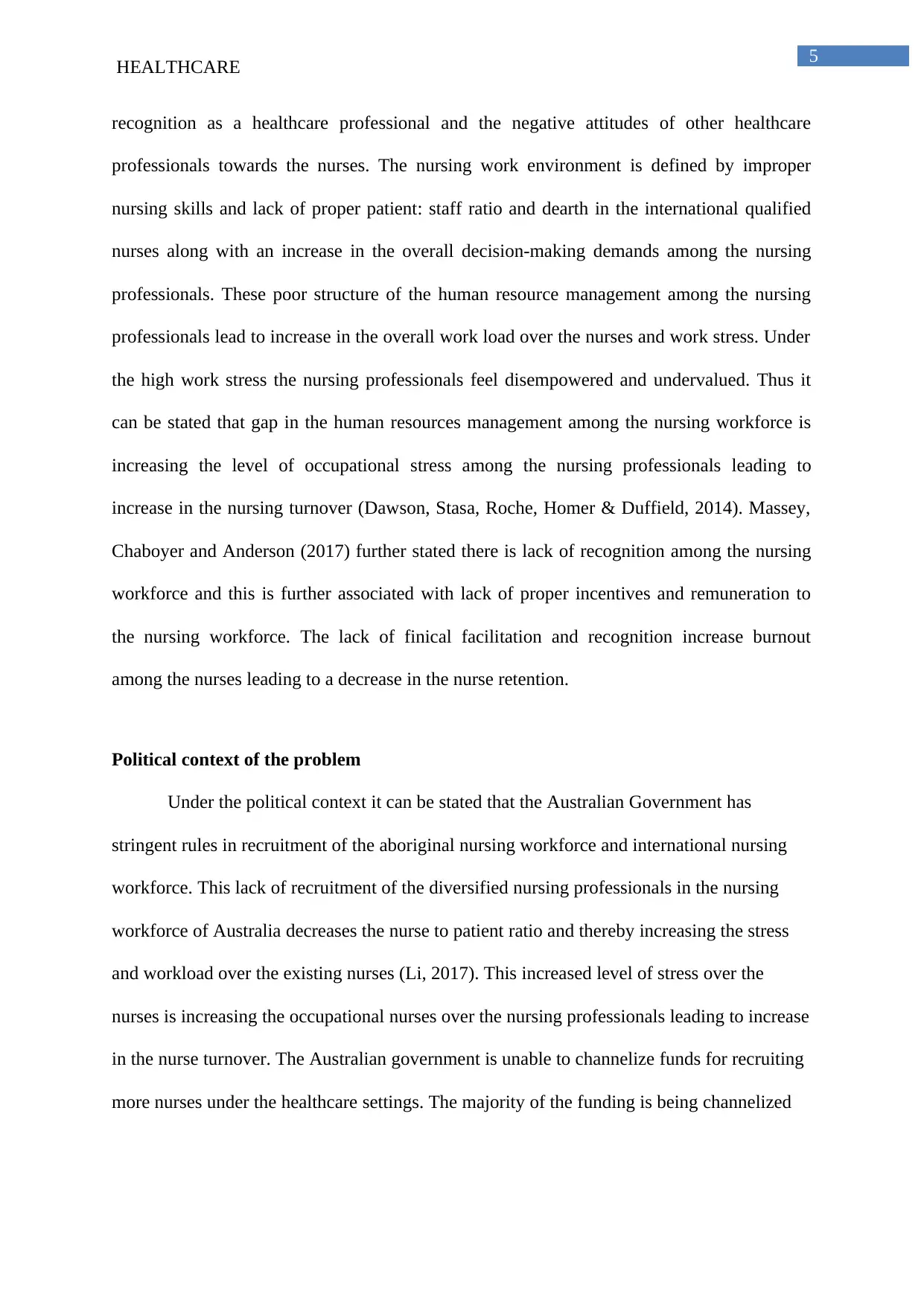
5
HEALTHCARE
recognition as a healthcare professional and the negative attitudes of other healthcare
professionals towards the nurses. The nursing work environment is defined by improper
nursing skills and lack of proper patient: staff ratio and dearth in the international qualified
nurses along with an increase in the overall decision-making demands among the nursing
professionals. These poor structure of the human resource management among the nursing
professionals lead to increase in the overall work load over the nurses and work stress. Under
the high work stress the nursing professionals feel disempowered and undervalued. Thus it
can be stated that gap in the human resources management among the nursing workforce is
increasing the level of occupational stress among the nursing professionals leading to
increase in the nursing turnover (Dawson, Stasa, Roche, Homer & Duffield, 2014). Massey,
Chaboyer and Anderson (2017) further stated there is lack of recognition among the nursing
workforce and this is further associated with lack of proper incentives and remuneration to
the nursing workforce. The lack of finical facilitation and recognition increase burnout
among the nurses leading to a decrease in the nurse retention.
Political context of the problem
Under the political context it can be stated that the Australian Government has
stringent rules in recruitment of the aboriginal nursing workforce and international nursing
workforce. This lack of recruitment of the diversified nursing professionals in the nursing
workforce of Australia decreases the nurse to patient ratio and thereby increasing the stress
and workload over the existing nurses (Li, 2017). This increased level of stress over the
nurses is increasing the occupational nurses over the nursing professionals leading to increase
in the nurse turnover. The Australian government is unable to channelize funds for recruiting
more nurses under the healthcare settings. The majority of the funding is being channelized
HEALTHCARE
recognition as a healthcare professional and the negative attitudes of other healthcare
professionals towards the nurses. The nursing work environment is defined by improper
nursing skills and lack of proper patient: staff ratio and dearth in the international qualified
nurses along with an increase in the overall decision-making demands among the nursing
professionals. These poor structure of the human resource management among the nursing
professionals lead to increase in the overall work load over the nurses and work stress. Under
the high work stress the nursing professionals feel disempowered and undervalued. Thus it
can be stated that gap in the human resources management among the nursing workforce is
increasing the level of occupational stress among the nursing professionals leading to
increase in the nursing turnover (Dawson, Stasa, Roche, Homer & Duffield, 2014). Massey,
Chaboyer and Anderson (2017) further stated there is lack of recognition among the nursing
workforce and this is further associated with lack of proper incentives and remuneration to
the nursing workforce. The lack of finical facilitation and recognition increase burnout
among the nurses leading to a decrease in the nurse retention.
Political context of the problem
Under the political context it can be stated that the Australian Government has
stringent rules in recruitment of the aboriginal nursing workforce and international nursing
workforce. This lack of recruitment of the diversified nursing professionals in the nursing
workforce of Australia decreases the nurse to patient ratio and thereby increasing the stress
and workload over the existing nurses (Li, 2017). This increased level of stress over the
nurses is increasing the occupational nurses over the nursing professionals leading to increase
in the nurse turnover. The Australian government is unable to channelize funds for recruiting
more nurses under the healthcare settings. The majority of the funding is being channelized
⊘ This is a preview!⊘
Do you want full access?
Subscribe today to unlock all pages.

Trusted by 1+ million students worldwide
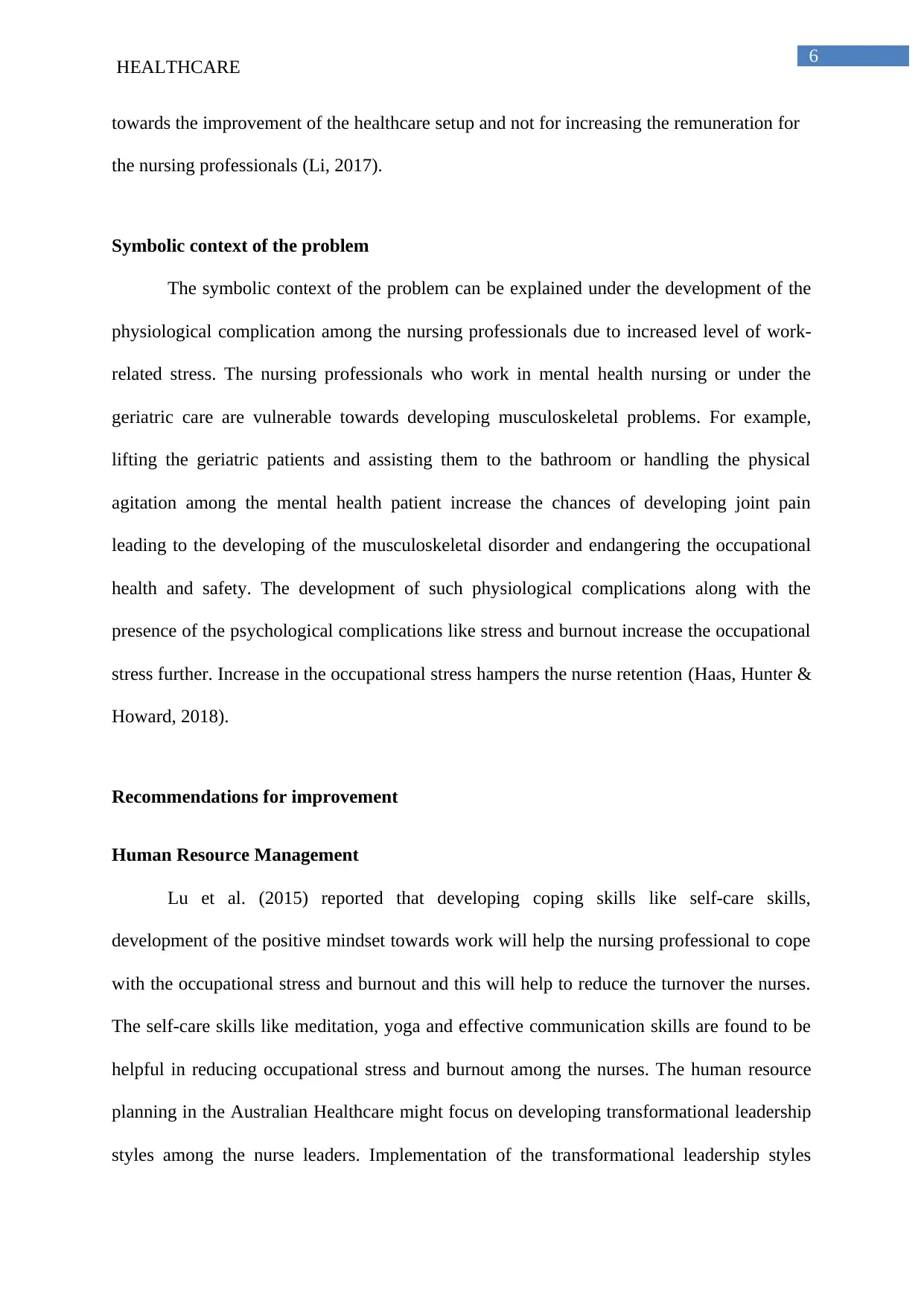
6
HEALTHCARE
towards the improvement of the healthcare setup and not for increasing the remuneration for
the nursing professionals (Li, 2017).
Symbolic context of the problem
The symbolic context of the problem can be explained under the development of the
physiological complication among the nursing professionals due to increased level of work-
related stress. The nursing professionals who work in mental health nursing or under the
geriatric care are vulnerable towards developing musculoskeletal problems. For example,
lifting the geriatric patients and assisting them to the bathroom or handling the physical
agitation among the mental health patient increase the chances of developing joint pain
leading to the developing of the musculoskeletal disorder and endangering the occupational
health and safety. The development of such physiological complications along with the
presence of the psychological complications like stress and burnout increase the occupational
stress further. Increase in the occupational stress hampers the nurse retention (Haas, Hunter &
Howard, 2018).
Recommendations for improvement
Human Resource Management
Lu et al. (2015) reported that developing coping skills like self-care skills,
development of the positive mindset towards work will help the nursing professional to cope
with the occupational stress and burnout and this will help to reduce the turnover the nurses.
The self-care skills like meditation, yoga and effective communication skills are found to be
helpful in reducing occupational stress and burnout among the nurses. The human resource
planning in the Australian Healthcare might focus on developing transformational leadership
styles among the nurse leaders. Implementation of the transformational leadership styles
HEALTHCARE
towards the improvement of the healthcare setup and not for increasing the remuneration for
the nursing professionals (Li, 2017).
Symbolic context of the problem
The symbolic context of the problem can be explained under the development of the
physiological complication among the nursing professionals due to increased level of work-
related stress. The nursing professionals who work in mental health nursing or under the
geriatric care are vulnerable towards developing musculoskeletal problems. For example,
lifting the geriatric patients and assisting them to the bathroom or handling the physical
agitation among the mental health patient increase the chances of developing joint pain
leading to the developing of the musculoskeletal disorder and endangering the occupational
health and safety. The development of such physiological complications along with the
presence of the psychological complications like stress and burnout increase the occupational
stress further. Increase in the occupational stress hampers the nurse retention (Haas, Hunter &
Howard, 2018).
Recommendations for improvement
Human Resource Management
Lu et al. (2015) reported that developing coping skills like self-care skills,
development of the positive mindset towards work will help the nursing professional to cope
with the occupational stress and burnout and this will help to reduce the turnover the nurses.
The self-care skills like meditation, yoga and effective communication skills are found to be
helpful in reducing occupational stress and burnout among the nurses. The human resource
planning in the Australian Healthcare might focus on developing transformational leadership
styles among the nurse leaders. Implementation of the transformational leadership styles
Paraphrase This Document
Need a fresh take? Get an instant paraphrase of this document with our AI Paraphraser
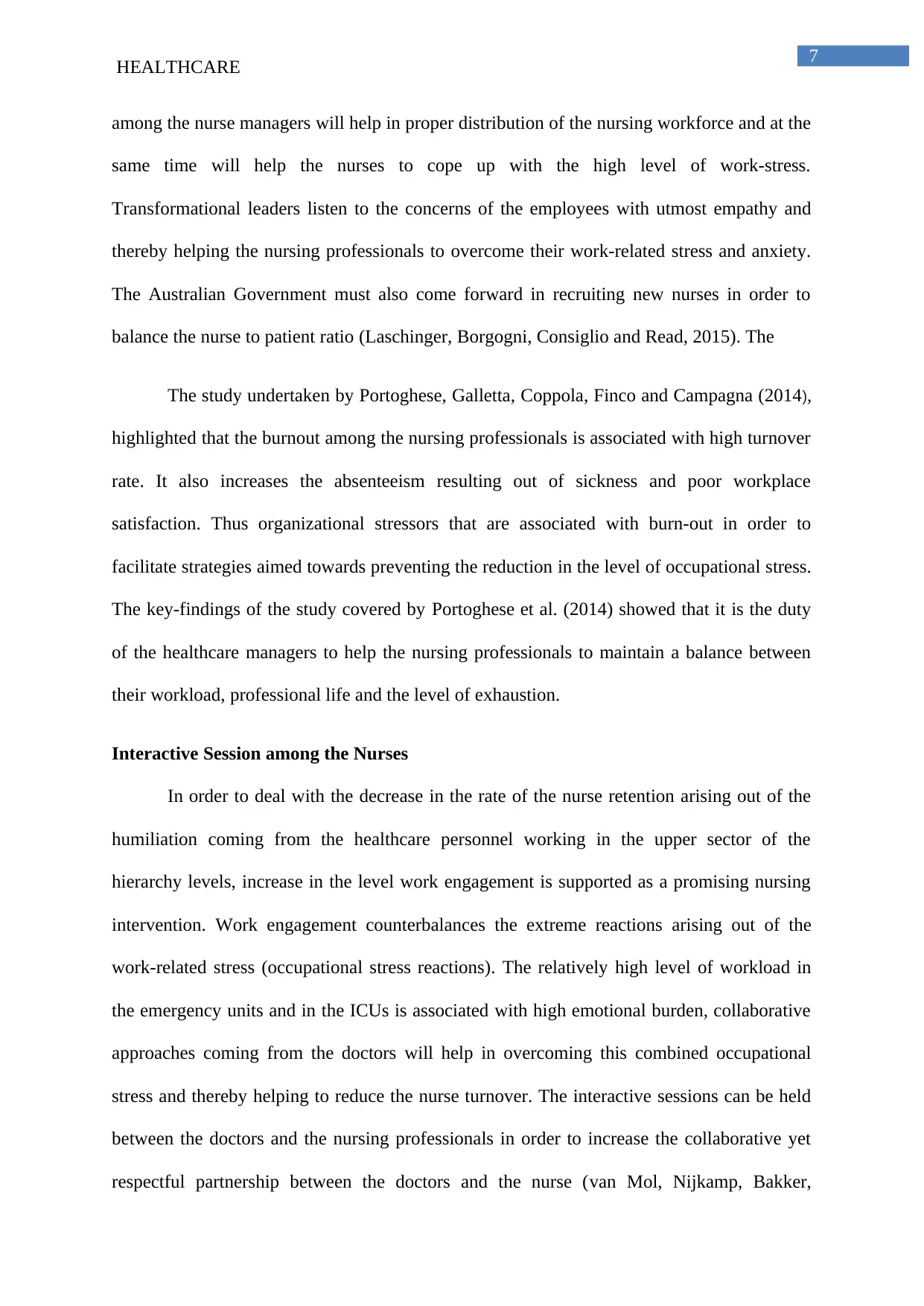
7
HEALTHCARE
among the nurse managers will help in proper distribution of the nursing workforce and at the
same time will help the nurses to cope up with the high level of work-stress.
Transformational leaders listen to the concerns of the employees with utmost empathy and
thereby helping the nursing professionals to overcome their work-related stress and anxiety.
The Australian Government must also come forward in recruiting new nurses in order to
balance the nurse to patient ratio (Laschinger, Borgogni, Consiglio and Read, 2015). The
The study undertaken by Portoghese, Galletta, Coppola, Finco and Campagna (2014),
highlighted that the burnout among the nursing professionals is associated with high turnover
rate. It also increases the absenteeism resulting out of sickness and poor workplace
satisfaction. Thus organizational stressors that are associated with burn-out in order to
facilitate strategies aimed towards preventing the reduction in the level of occupational stress.
The key-findings of the study covered by Portoghese et al. (2014) showed that it is the duty
of the healthcare managers to help the nursing professionals to maintain a balance between
their workload, professional life and the level of exhaustion.
Interactive Session among the Nurses
In order to deal with the decrease in the rate of the nurse retention arising out of the
humiliation coming from the healthcare personnel working in the upper sector of the
hierarchy levels, increase in the level work engagement is supported as a promising nursing
intervention. Work engagement counterbalances the extreme reactions arising out of the
work-related stress (occupational stress reactions). The relatively high level of workload in
the emergency units and in the ICUs is associated with high emotional burden, collaborative
approaches coming from the doctors will help in overcoming this combined occupational
stress and thereby helping to reduce the nurse turnover. The interactive sessions can be held
between the doctors and the nursing professionals in order to increase the collaborative yet
respectful partnership between the doctors and the nurse (van Mol, Nijkamp, Bakker,
HEALTHCARE
among the nurse managers will help in proper distribution of the nursing workforce and at the
same time will help the nurses to cope up with the high level of work-stress.
Transformational leaders listen to the concerns of the employees with utmost empathy and
thereby helping the nursing professionals to overcome their work-related stress and anxiety.
The Australian Government must also come forward in recruiting new nurses in order to
balance the nurse to patient ratio (Laschinger, Borgogni, Consiglio and Read, 2015). The
The study undertaken by Portoghese, Galletta, Coppola, Finco and Campagna (2014),
highlighted that the burnout among the nursing professionals is associated with high turnover
rate. It also increases the absenteeism resulting out of sickness and poor workplace
satisfaction. Thus organizational stressors that are associated with burn-out in order to
facilitate strategies aimed towards preventing the reduction in the level of occupational stress.
The key-findings of the study covered by Portoghese et al. (2014) showed that it is the duty
of the healthcare managers to help the nursing professionals to maintain a balance between
their workload, professional life and the level of exhaustion.
Interactive Session among the Nurses
In order to deal with the decrease in the rate of the nurse retention arising out of the
humiliation coming from the healthcare personnel working in the upper sector of the
hierarchy levels, increase in the level work engagement is supported as a promising nursing
intervention. Work engagement counterbalances the extreme reactions arising out of the
work-related stress (occupational stress reactions). The relatively high level of workload in
the emergency units and in the ICUs is associated with high emotional burden, collaborative
approaches coming from the doctors will help in overcoming this combined occupational
stress and thereby helping to reduce the nurse turnover. The interactive sessions can be held
between the doctors and the nursing professionals in order to increase the collaborative yet
respectful partnership between the doctors and the nurse (van Mol, Nijkamp, Bakker,
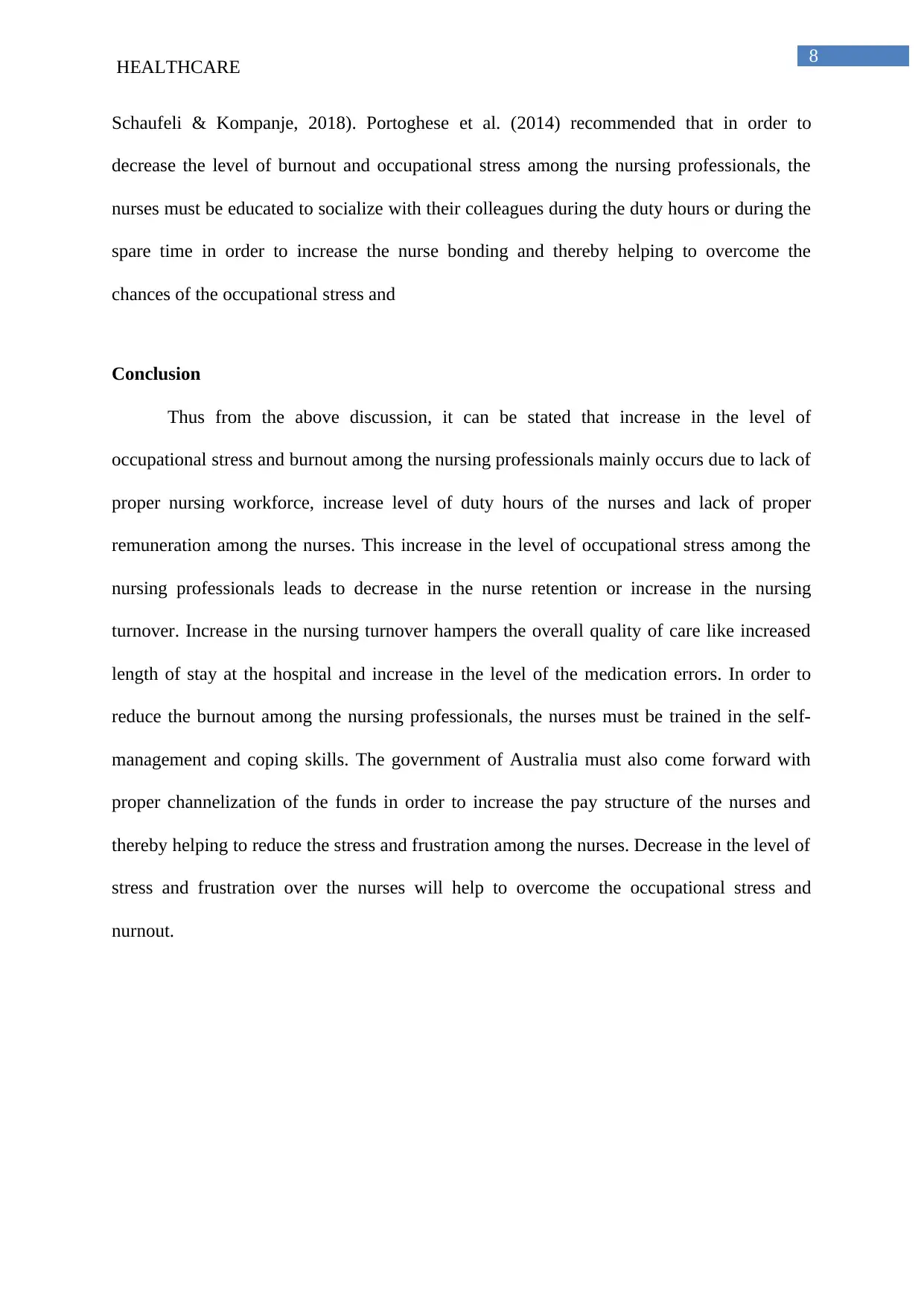
8
HEALTHCARE
Schaufeli & Kompanje, 2018). Portoghese et al. (2014) recommended that in order to
decrease the level of burnout and occupational stress among the nursing professionals, the
nurses must be educated to socialize with their colleagues during the duty hours or during the
spare time in order to increase the nurse bonding and thereby helping to overcome the
chances of the occupational stress and
Conclusion
Thus from the above discussion, it can be stated that increase in the level of
occupational stress and burnout among the nursing professionals mainly occurs due to lack of
proper nursing workforce, increase level of duty hours of the nurses and lack of proper
remuneration among the nurses. This increase in the level of occupational stress among the
nursing professionals leads to decrease in the nurse retention or increase in the nursing
turnover. Increase in the nursing turnover hampers the overall quality of care like increased
length of stay at the hospital and increase in the level of the medication errors. In order to
reduce the burnout among the nursing professionals, the nurses must be trained in the self-
management and coping skills. The government of Australia must also come forward with
proper channelization of the funds in order to increase the pay structure of the nurses and
thereby helping to reduce the stress and frustration among the nurses. Decrease in the level of
stress and frustration over the nurses will help to overcome the occupational stress and
nurnout.
HEALTHCARE
Schaufeli & Kompanje, 2018). Portoghese et al. (2014) recommended that in order to
decrease the level of burnout and occupational stress among the nursing professionals, the
nurses must be educated to socialize with their colleagues during the duty hours or during the
spare time in order to increase the nurse bonding and thereby helping to overcome the
chances of the occupational stress and
Conclusion
Thus from the above discussion, it can be stated that increase in the level of
occupational stress and burnout among the nursing professionals mainly occurs due to lack of
proper nursing workforce, increase level of duty hours of the nurses and lack of proper
remuneration among the nurses. This increase in the level of occupational stress among the
nursing professionals leads to decrease in the nurse retention or increase in the nursing
turnover. Increase in the nursing turnover hampers the overall quality of care like increased
length of stay at the hospital and increase in the level of the medication errors. In order to
reduce the burnout among the nursing professionals, the nurses must be trained in the self-
management and coping skills. The government of Australia must also come forward with
proper channelization of the funds in order to increase the pay structure of the nurses and
thereby helping to reduce the stress and frustration among the nurses. Decrease in the level of
stress and frustration over the nurses will help to overcome the occupational stress and
nurnout.
⊘ This is a preview!⊘
Do you want full access?
Subscribe today to unlock all pages.

Trusted by 1+ million students worldwide
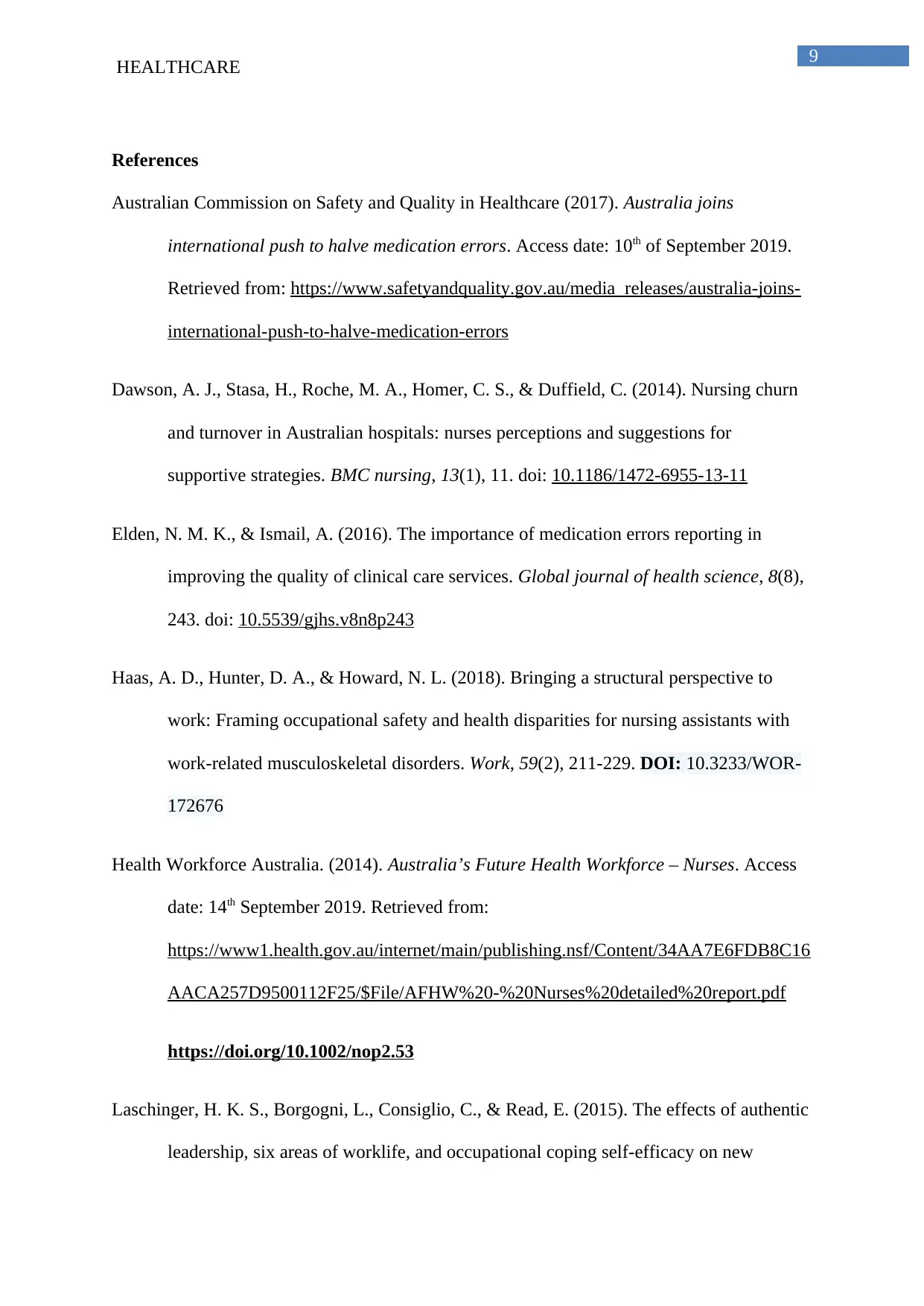
9
HEALTHCARE
References
Australian Commission on Safety and Quality in Healthcare (2017). Australia joins
international push to halve medication errors. Access date: 10th of September 2019.
Retrieved from: https://www.safetyandquality.gov.au/media_releases/australia-joins-
international-push-to-halve-medication-errors
Dawson, A. J., Stasa, H., Roche, M. A., Homer, C. S., & Duffield, C. (2014). Nursing churn
and turnover in Australian hospitals: nurses perceptions and suggestions for
supportive strategies. BMC nursing, 13(1), 11. doi: 10.1186/1472-6955-13-11
Elden, N. M. K., & Ismail, A. (2016). The importance of medication errors reporting in
improving the quality of clinical care services. Global journal of health science, 8(8),
243. doi: 10.5539/gjhs.v8n8p243
Haas, A. D., Hunter, D. A., & Howard, N. L. (2018). Bringing a structural perspective to
work: Framing occupational safety and health disparities for nursing assistants with
work-related musculoskeletal disorders. Work, 59(2), 211-229. DOI: 10.3233/WOR-
172676
Health Workforce Australia. (2014). Australia’s Future Health Workforce – Nurses. Access
date: 14th September 2019. Retrieved from:
https://www1.health.gov.au/internet/main/publishing.nsf/Content/34AA7E6FDB8C16
AACA257D9500112F25/$File/AFHW%20-%20Nurses%20detailed%20report.pdf
https://doi.org/10.1002/nop2.53
Laschinger, H. K. S., Borgogni, L., Consiglio, C., & Read, E. (2015). The effects of authentic
leadership, six areas of worklife, and occupational coping self-efficacy on new
HEALTHCARE
References
Australian Commission on Safety and Quality in Healthcare (2017). Australia joins
international push to halve medication errors. Access date: 10th of September 2019.
Retrieved from: https://www.safetyandquality.gov.au/media_releases/australia-joins-
international-push-to-halve-medication-errors
Dawson, A. J., Stasa, H., Roche, M. A., Homer, C. S., & Duffield, C. (2014). Nursing churn
and turnover in Australian hospitals: nurses perceptions and suggestions for
supportive strategies. BMC nursing, 13(1), 11. doi: 10.1186/1472-6955-13-11
Elden, N. M. K., & Ismail, A. (2016). The importance of medication errors reporting in
improving the quality of clinical care services. Global journal of health science, 8(8),
243. doi: 10.5539/gjhs.v8n8p243
Haas, A. D., Hunter, D. A., & Howard, N. L. (2018). Bringing a structural perspective to
work: Framing occupational safety and health disparities for nursing assistants with
work-related musculoskeletal disorders. Work, 59(2), 211-229. DOI: 10.3233/WOR-
172676
Health Workforce Australia. (2014). Australia’s Future Health Workforce – Nurses. Access
date: 14th September 2019. Retrieved from:
https://www1.health.gov.au/internet/main/publishing.nsf/Content/34AA7E6FDB8C16
AACA257D9500112F25/$File/AFHW%20-%20Nurses%20detailed%20report.pdf
https://doi.org/10.1002/nop2.53
Laschinger, H. K. S., Borgogni, L., Consiglio, C., & Read, E. (2015). The effects of authentic
leadership, six areas of worklife, and occupational coping self-efficacy on new
Paraphrase This Document
Need a fresh take? Get an instant paraphrase of this document with our AI Paraphraser
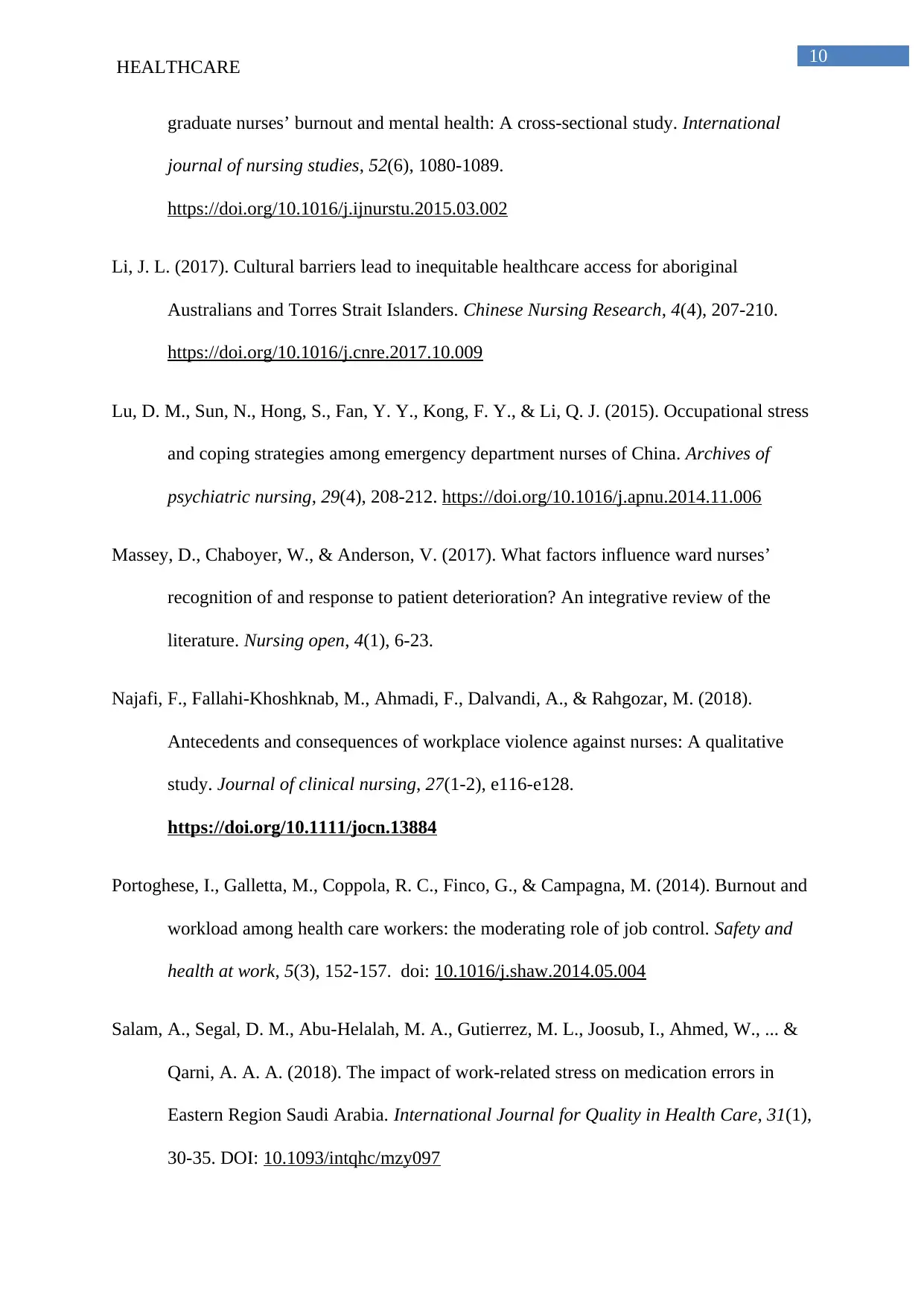
10
HEALTHCARE
graduate nurses’ burnout and mental health: A cross-sectional study. International
journal of nursing studies, 52(6), 1080-1089.
https://doi.org/10.1016/j.ijnurstu.2015.03.002
Li, J. L. (2017). Cultural barriers lead to inequitable healthcare access for aboriginal
Australians and Torres Strait Islanders. Chinese Nursing Research, 4(4), 207-210.
https://doi.org/10.1016/j.cnre.2017.10.009
Lu, D. M., Sun, N., Hong, S., Fan, Y. Y., Kong, F. Y., & Li, Q. J. (2015). Occupational stress
and coping strategies among emergency department nurses of China. Archives of
psychiatric nursing, 29(4), 208-212. https://doi.org/10.1016/j.apnu.2014.11.006
Massey, D., Chaboyer, W., & Anderson, V. (2017). What factors influence ward nurses’
recognition of and response to patient deterioration? An integrative review of the
literature. Nursing open, 4(1), 6-23.
Najafi, F., Fallahi‐Khoshknab, M., Ahmadi, F., Dalvandi, A., & Rahgozar, M. (2018).
Antecedents and consequences of workplace violence against nurses: A qualitative
study. Journal of clinical nursing, 27(1-2), e116-e128.
https://doi.org/10.1111/jocn.13884
Portoghese, I., Galletta, M., Coppola, R. C., Finco, G., & Campagna, M. (2014). Burnout and
workload among health care workers: the moderating role of job control. Safety and
health at work, 5(3), 152-157. doi: 10.1016/j.shaw.2014.05.004
Salam, A., Segal, D. M., Abu-Helalah, M. A., Gutierrez, M. L., Joosub, I., Ahmed, W., ... &
Qarni, A. A. A. (2018). The impact of work-related stress on medication errors in
Eastern Region Saudi Arabia. International Journal for Quality in Health Care, 31(1),
30-35. DOI: 10.1093/intqhc/mzy097
HEALTHCARE
graduate nurses’ burnout and mental health: A cross-sectional study. International
journal of nursing studies, 52(6), 1080-1089.
https://doi.org/10.1016/j.ijnurstu.2015.03.002
Li, J. L. (2017). Cultural barriers lead to inequitable healthcare access for aboriginal
Australians and Torres Strait Islanders. Chinese Nursing Research, 4(4), 207-210.
https://doi.org/10.1016/j.cnre.2017.10.009
Lu, D. M., Sun, N., Hong, S., Fan, Y. Y., Kong, F. Y., & Li, Q. J. (2015). Occupational stress
and coping strategies among emergency department nurses of China. Archives of
psychiatric nursing, 29(4), 208-212. https://doi.org/10.1016/j.apnu.2014.11.006
Massey, D., Chaboyer, W., & Anderson, V. (2017). What factors influence ward nurses’
recognition of and response to patient deterioration? An integrative review of the
literature. Nursing open, 4(1), 6-23.
Najafi, F., Fallahi‐Khoshknab, M., Ahmadi, F., Dalvandi, A., & Rahgozar, M. (2018).
Antecedents and consequences of workplace violence against nurses: A qualitative
study. Journal of clinical nursing, 27(1-2), e116-e128.
https://doi.org/10.1111/jocn.13884
Portoghese, I., Galletta, M., Coppola, R. C., Finco, G., & Campagna, M. (2014). Burnout and
workload among health care workers: the moderating role of job control. Safety and
health at work, 5(3), 152-157. doi: 10.1016/j.shaw.2014.05.004
Salam, A., Segal, D. M., Abu-Helalah, M. A., Gutierrez, M. L., Joosub, I., Ahmed, W., ... &
Qarni, A. A. A. (2018). The impact of work-related stress on medication errors in
Eastern Region Saudi Arabia. International Journal for Quality in Health Care, 31(1),
30-35. DOI: 10.1093/intqhc/mzy097
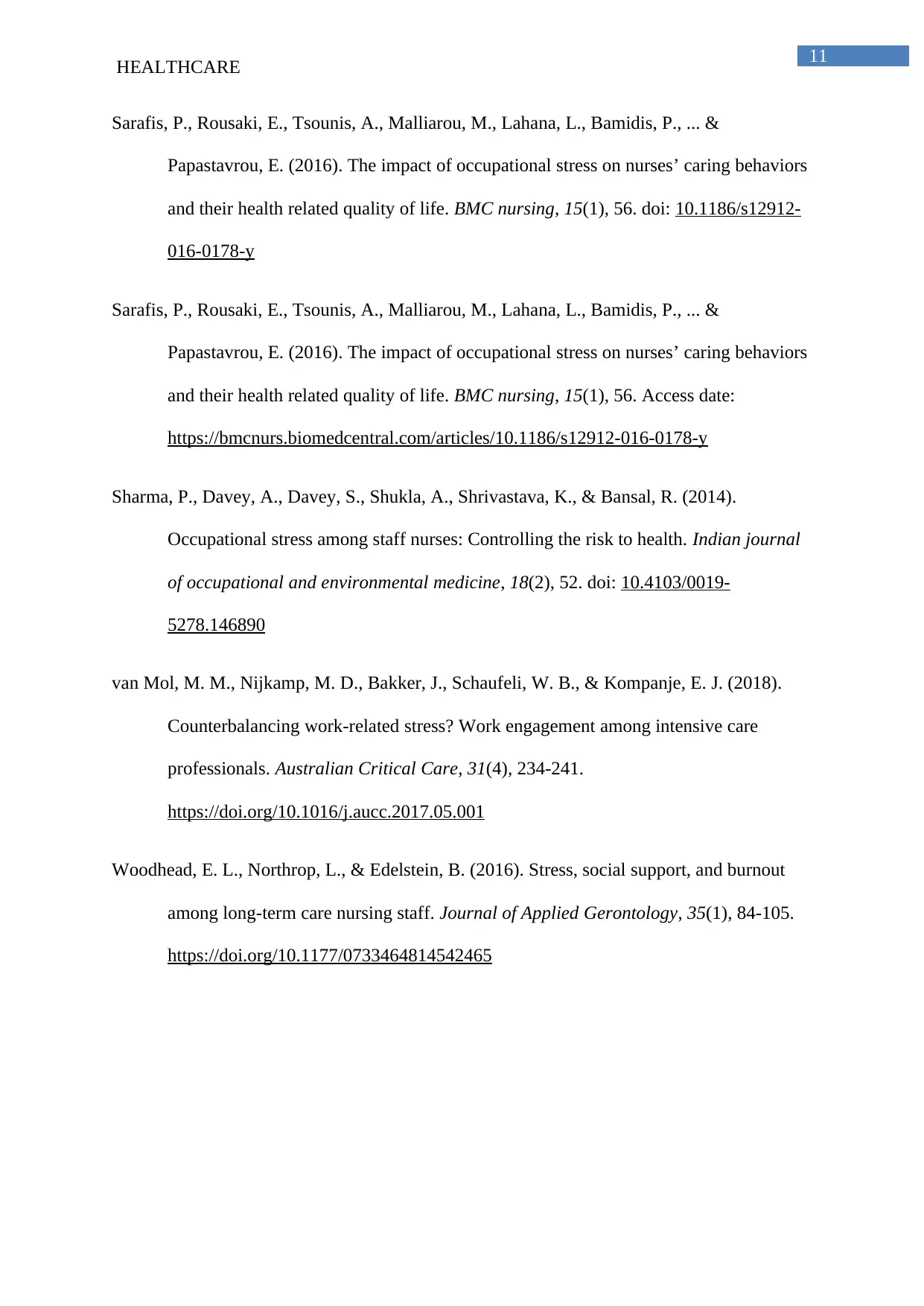
11
HEALTHCARE
Sarafis, P., Rousaki, E., Tsounis, A., Malliarou, M., Lahana, L., Bamidis, P., ... &
Papastavrou, E. (2016). The impact of occupational stress on nurses’ caring behaviors
and their health related quality of life. BMC nursing, 15(1), 56. doi: 10.1186/s12912-
016-0178-y
Sarafis, P., Rousaki, E., Tsounis, A., Malliarou, M., Lahana, L., Bamidis, P., ... &
Papastavrou, E. (2016). The impact of occupational stress on nurses’ caring behaviors
and their health related quality of life. BMC nursing, 15(1), 56. Access date:
https://bmcnurs.biomedcentral.com/articles/10.1186/s12912-016-0178-y
Sharma, P., Davey, A., Davey, S., Shukla, A., Shrivastava, K., & Bansal, R. (2014).
Occupational stress among staff nurses: Controlling the risk to health. Indian journal
of occupational and environmental medicine, 18(2), 52. doi: 10.4103/0019-
5278.146890
van Mol, M. M., Nijkamp, M. D., Bakker, J., Schaufeli, W. B., & Kompanje, E. J. (2018).
Counterbalancing work-related stress? Work engagement among intensive care
professionals. Australian Critical Care, 31(4), 234-241.
https://doi.org/10.1016/j.aucc.2017.05.001
Woodhead, E. L., Northrop, L., & Edelstein, B. (2016). Stress, social support, and burnout
among long-term care nursing staff. Journal of Applied Gerontology, 35(1), 84-105.
https://doi.org/10.1177/0733464814542465
HEALTHCARE
Sarafis, P., Rousaki, E., Tsounis, A., Malliarou, M., Lahana, L., Bamidis, P., ... &
Papastavrou, E. (2016). The impact of occupational stress on nurses’ caring behaviors
and their health related quality of life. BMC nursing, 15(1), 56. doi: 10.1186/s12912-
016-0178-y
Sarafis, P., Rousaki, E., Tsounis, A., Malliarou, M., Lahana, L., Bamidis, P., ... &
Papastavrou, E. (2016). The impact of occupational stress on nurses’ caring behaviors
and their health related quality of life. BMC nursing, 15(1), 56. Access date:
https://bmcnurs.biomedcentral.com/articles/10.1186/s12912-016-0178-y
Sharma, P., Davey, A., Davey, S., Shukla, A., Shrivastava, K., & Bansal, R. (2014).
Occupational stress among staff nurses: Controlling the risk to health. Indian journal
of occupational and environmental medicine, 18(2), 52. doi: 10.4103/0019-
5278.146890
van Mol, M. M., Nijkamp, M. D., Bakker, J., Schaufeli, W. B., & Kompanje, E. J. (2018).
Counterbalancing work-related stress? Work engagement among intensive care
professionals. Australian Critical Care, 31(4), 234-241.
https://doi.org/10.1016/j.aucc.2017.05.001
Woodhead, E. L., Northrop, L., & Edelstein, B. (2016). Stress, social support, and burnout
among long-term care nursing staff. Journal of Applied Gerontology, 35(1), 84-105.
https://doi.org/10.1177/0733464814542465
⊘ This is a preview!⊘
Do you want full access?
Subscribe today to unlock all pages.

Trusted by 1+ million students worldwide
1 out of 12
Related Documents
Your All-in-One AI-Powered Toolkit for Academic Success.
+13062052269
info@desklib.com
Available 24*7 on WhatsApp / Email
![[object Object]](/_next/static/media/star-bottom.7253800d.svg)
Unlock your academic potential
Copyright © 2020–2026 A2Z Services. All Rights Reserved. Developed and managed by ZUCOL.




